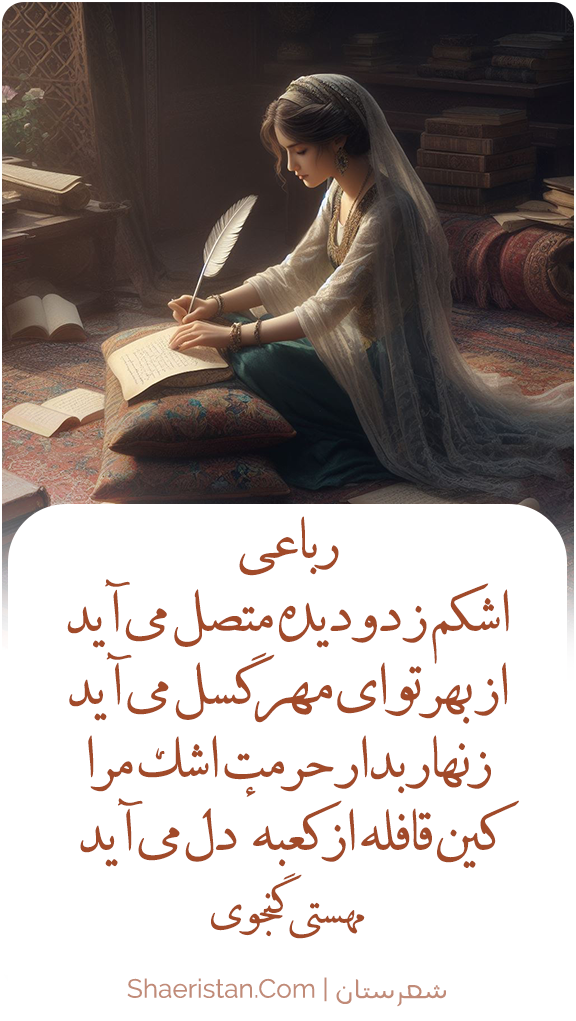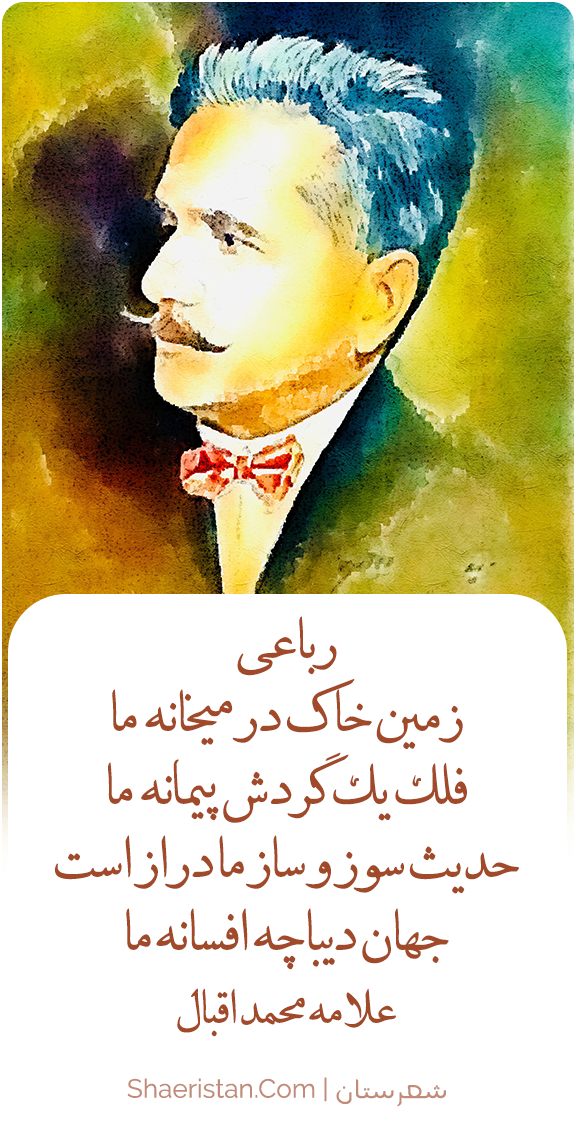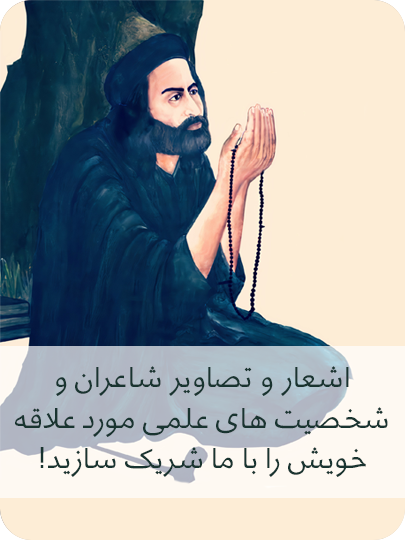Rumi said: The saying, “Hearts bear witness to one another,” refers to a hidden reality. If all reality were openly revealed, what need would there be for words? Similarly, when the heart bears witness, what need is there for the testimony of the tongue?
The Amir said: “Certainly the heart bears witness. But the heart plays one part by itself, the ear another, the eye another, the tongue another. There is need for each one, so that the whole can be realized.”
Rumi said: If the heart is totally absorbed, then all the other senses are obliterated in it, and there is no need for the tongue. Take the case of Laila: She was not a spiritual being, but of flesh, fashioned of water and clay. Yet passion for her produced such absorption, and so utterly seized and overwhelmed Majnun, that he had no need to see Laila with his eyes, no need to hear her voice. He could not separate himself from the thought of her, causing him to cry:
Your name is upon my tongue.
Your image is in my sight.
Your memory in my heart,
Where can I send these words I write?
The physical has such power that passion can bring us into a state where we are never apart from our beloved. All our senses are absorbed: sight, hearing, smell and the rest. No sense seeks a separate view, all being united. If each sense plays its part in full, all are immersed in one experience and desire nothing else. Seeking for a separate view proves that one sense has not found its true, whole allotment. It is enjoying an incomplete portion and therefore is not immersed, nor fulfilled. Then the other senses begin seeking their own part, and all become divided.
From the viewpoint of reality, all the senses see one thing, but from the standpoint of outward form they are each different from the other. When one sense is moved to absorption, all the senses become absorbed in it. When a fly flies upward it moves its wings, its head and its whole body separately; but when it is immersed in honey, then all its parts are alike – none can move at all.
Absorption is such that whoever enters it is no longer there. They make no more efforts, they cease to act and move. They are immersed in the water. No action is their action; it is the action of the water. But if they flail about in the water with their hands and feet, they are not truly submerged. If they utter a cry, “I am drowning,” this too is not absorption.
Take the famous utterance, “I am God.” Some people think this is a great pretension, but “I am God” is in fact a great humility. Those who say, instead, “I am a servant of God” believe that two exist, themselves and God. But those who say, “I am God” have become nothing and have cast themselves to the winds. They say, “I am God” meaning, “I am not, God is all. There is no existence but God. I have lost all separation. I am nothing.” In this the humility is greater.
This is what ordinary people don’t understand. When they render service in honor of God’s glory, their servanthood is still present. Even though it is for the sake of God, they still see themselves and their own actions as well as God – they are not drowned in the water. That person is drowned when no movement, nor any action belongs to them, all their movements spring from the movement of the water.
A lion was chasing a deer, and the deer was fleeing. There were two beings evident: the lion and the deer. But when the lion caught up with the deer, and the deer was overpowered beneath the lion’s clutch, and out of terror became unconscious and senseless, collapsing before the lion in that moment only the lion remained. The deer was effaced and no longer existed.
True absorption is when God creates in saints a fear. This is not the fear of men and women who are scared of lions, leopards and death. Rather, it is the fear of separation. This fear is a gift from God, just as security, pleasure and joy, eating and sleeping – all these are gifts from God.
God shows the saints, while they are fully conscious, forms that only they can see. The inner form of the lion, leopard, and fire become visible so they will know that reality is not of this world, but of the world unseen, projected forth to them. In the same way, they are shown their own Self in magnificent form. Likewise, gardens and rivers, maids of Paradise and palaces, all types of food and drink, robes of honor, fleet steeds, cities, castles and every kind of marvel – they know these are not of this world. God shows and reveals these secrets before their eyes. Thus they come to know with certainty that fear of separation comes from God, as do security, comfort and all spiritual displays.
Now this fear of separation does not resemble the fears that most men and women know, because it is a result of revelation and experience. God clearly shows the saint that all things belong to God. The philosophers may know this, but they know it by intellectual proof, and proof is not permanent. The pleasure that comes from proof will not last. When the memory of the proof passes, its warmth and thrill pass away as well.
Thus, we know by proof that this house had a builder. We know by proof that this builder had eyes and was not blind, had power and was not powerless, was living and not dead, and existed before the house was built. All these facts we know, but we know them by proof. Such proof is not permanent, and is soon forgotten. Lovers of God, however, being absorbed in God, have come to know the Builder and have seen with the eye of knowingness. They have eaten bread and salt together, and mingled the two. The Builder is never absent from their heart and their gaze. Men and women such as this pass away in God. With them, sin is not sin, and crime is not crime, since they are absorbed.
A certain king ordered his slaves, every one, to take in their hand a golden cup to greet a guest. His favorite slave was also commanded to take a cup. When the king showed his face, that special slave, on beholding the king, lost control of himself and was overwhelmed. The cup fell from his hand and was shattered. When the other slaves saw this they said, “Perhaps we should do this as well,” and they cast down their cups deliberately.
“Why did you do that?” the king scolded them.
“He was your favorite, and that was what he did,” they replied.
“Fools!” the king cried out. “He didn’t do that. I did it.”
To outward eyes, all of the slaves were sinful. But that one act was the very acme of obedience. Indeed, it transcended obedience and sin. Of them all, the true lover was that one slave. The others were but followers of the king. Thus, they followed that slave, since he had become the essence of the king, only outwardly wearing the form of slavery. He was filled with the beauty of the king.
God declares, “If it weren’t for you, I would never have created the heavens.” This is the same as “I am God.” It means, “I created the heavens for I love you as Myself.” This is “I am God” in another language and another tongue.
Though the words of the great saints appear in a hundred different forms, since God is one and the Way is one, how can their words be different? Though their teachings appear to contradict, their meaning is one. Separation exists in their outward form only; in inner purpose they all agree.
A prince orders a tent to be stitched. One person twists the rope, another strikes the pegs, another weaves the cloth, another stitches, another rends, another uses a needle. Though to outward appearance they are diverse and different, in inner purpose they are united and performing a single task.
So it is with the affairs of this world. When you look at it carefully, all are doing God’s service; reprobate and righteous, sinner and disciple, devil and angel. For example, the king wants to test and try his slaves so the steadfast can be sorted from the weak-hearted, the loyal from the traitor, the faithful from the fake. If he did not have tempters and provokers, how could he test his slaves’ loyalty? So, the tempters and provokers are serving the king, since it is by the king’s will that they act. He sends a wind to show the difference between the stable and the unstable, to separate the gnat from the sparrow-hawk, so the gnat will vanish and the sparrow-hawk remain.
A certain king ordered a slavegirl to adorn herself and offer herself to his slaves, so their loyalty could be revealed. Though the girl’s action appears sinful outwardly, in reality she is doing the king’s work.
The great saints have seen for themselves, not by proof and rote, but face to face and unveiled, that all people – good or evil – are obedient servants of God. Nothing exists that does not proclaim God’s praise. Therefore, to the saints, this world itself is the resurrection, since the resurrection means all people serving God and doing no other work but God’s work. These saints perceive this truth even here below, for even were the veil removed they would not increase in their certainty.
All may be servants, but some have been raised above others in their closeness to God. To those who are absorbed, all differences are lost. To those who have not yet arrived, many stages appear between one and another.
Let me cite a parallel. A gardener planted a tree, and the tree bore fruit. Surely, this tree that bore fruit is better than a hundred trees that are barren. It is possible those other trees may never bear at all, since there are many stages of growth where disease might attack. A pilgrim who reaches the Kaaba is better than the pilgrim who is still travelling in the desert. The one in the desert fears they may not pass the many landmarks and reach the Kaaba, while the former has already reached their destination. One certainty is better than a hundred doubts.
The Amir said: “Those who have not arrived still have hope.”
Rumi answered: What is the hopeful person compared to one who has arrived? There is a vast difference between fear and attainment. Why should I speak of such a difference when it is obvious to all? What I am speaking about is attainment, since there are many differences between the stations of attainment.
It is possible to indicate the various stages of fear and the stations of fear, but the stations of attainment have no indication. In the world of fear everyone decides what they will devote to honor God. One person gives through physical efforts, another donates their wealth, another sacrifices their life. One worships with fasting, another with prayer, another by ten prostrations, another by a hundred. These stages are very different and can easily be distinguished. In the same manner there are stages of travel from Konya to Caesarea that are distinct and well-known: One must pass Qaimaz, Uprukh, Sultan, and so forth. But the stages by sea from Antalya to Alexandria are without landmarks. The ship’s captain knows the signs, but they are not shared with landsmen since landsmen cannot understand.
The Amir said: “But even speaking about it imparts some benefit. We may not know everything, yet still we learn a little, and can find out and guess the rest.”
Rumi replied: Yes indeed, by Allah! Someone sits wakeful through the dark night, thinking of some way to find the day. Though they do not know how to get there, still, in waiting for daylight, the day approaches. Another person is travelling by caravan upon a dark night in a storming rain. They do not know where they have gone, which way they are passing, or what distance they have covered, but when day comes they see the results of that travelling and go on from there. Whoever labors for the glory of God, though both their eyes are sealed, their labor is not lost. Even an atom’s weight of good is not lost. Though all within is dark and veiled, and they do not see how far they have progressed, still in the end they will know. “This world is the seedplot of the world to come.” Whatever they sow here, they will reap in the next world.
Jesus laughed a lot. John wept a lot. John said to Jesus, “You have become exceedingly carefree against all the subtle deceits, that you laugh so much.” Jesus replied, “You have become exceedingly unmindful of the subtle, mysterious, wonderful graces and loving kindness of God, that you weep so much.” One of God’s saints was present at this incident. He asked God, “Which of these two has the higher station?” God answered, “He who thinks better of Me.” In other words, “I come when you think of Me. Each person has an image and an idea of Me. Whatever picture he forms of Me, there I am. I fill that picture where God dwells. I care nothing for that point of view where God does not exist. Cleanse your thoughts, O human, for they are My abode and dwelling place.”
Now test yourself as to weeping and laughter, fasting and prayer, solitude and company, and the rest. Which of these is more profitable to you? Whichever brings you straighter on the road and gains you the greatest advancement, choose that task. Take counsel from your heart, even though others may disagree. The truth is within you. Compare it with what others say. When they agree, then follow that course.
The physician comes to someone who is sick and questions the inward doctor; for within you there is a doctor, namely your natural temperament, instincts and inclinations. Therefore the external physician questions it: “This food that you ate, how was it? Was it light? Was it heavy? How was your sleep?” From what the inward doctor answers, the external physician makes their prescription. Therefore the root of the matter is the inward doctor; the patient’s own response. When this inner doctor is feeble and its temperament is corrupt, the sick person sees things incorrectly and gives skewed indications. They say that sugar is bitter, vinegar is sweet. Therefore they need the external physician to guide them until their own instinct is restored. After that they consult only their own inward doctor to find the counsel they need.
We have a similar doctor within our spiritual being. When this higher Self is feeble, our inward senses perceive falsely, and whatever we follow is contrary to the truth. So the saints are physicians who guide a person until their instinct is restored to its right balance, and their religion and their heart have gathered strength.
“Show me things as they truly are.”
Humanity is a mighty volume. Within the people of this world all things are written, but veils and darkness do not allow men and women to read the knowledge within themselves. The veils and darknesses are those many preoccupations, worldly desires and thoughts of every kind. Yet, though they are wrapped in darkness and are hidden by so many veils, they can still read something and therefore learn. Consider when these darknesses and veils are removed, what they will learn then, and what varieties of knowledge they will discover within!
After all, all these trades and professions – tailoring, building, carpentry, goldsmithery, science, astronomy, medicine and the rest of the world’s countless and innumerable callings – all these were discovered from within by some person, they were not revealed through stones and dirt. When they say that a raven taught people to bury the dead, even that was due to the reflection of a human being. Someone’s own inner urge drove them to learn that. After all, the instincts of the bird are but a part of humanity, but a part does not command the whole.
After the Amir left, someone said: “When the Amir comes, the Master utters mighty words. The words never stop, because he is a master of words. Words flow from him without interruption.”
Rumi said: If in winter time the trees do not put forth leaves and fruit, people should not think they are not working. They are continually at work. Winter is the season of gathering; summer is the season of spending. Everyone sees the spending, but they do not see the gathering in. In the same way, a person gives a party and spends all sorts of money on it. Everyone sees this, but no one sees the gathering in and collecting little by little for the sake of that entertainment. No one sees any of that. Yet the ingathering is the root of the matter, for the spending comes out of that income.
Whoever we are in unison with, we communicate with them every moment, even in silence, in absence and presence alike. Even in battle with others, we are together. We may strike against others with our fists; still, we are speaking to them and are absorbed in one action with them. Therefore we are in unison. Don’t become distracted by the fists – in those fists are spiritual gifts. You don’t believe this? Then open those fists, and see the difference between the sweet joy of unison, and pearls of great price.
Many people speak fine, graceful sayings and lofty wisdom in verse and prose. The inclination of the Amir towards us is not on account of lofty wisdom, graceful sayings and sermonizing. Things of that kind are to be found everywhere, and are by no means in short supply. His loving me and his inclination towards me is not for those things. He sees something else. He sees a light transcending what he finds from others.
It is related that a certain king summoned Majnun before him.
“What has happened to you. What has befallen you?” the king inquired. “You have disgraced yourself, forsaken your hearth and home, become wasted and utterly destroyed. What is Laila? What beauty is hers? I will show you many beautiful and lovely girls. Name your ransom and I will bestow them upon you.”
When they were brought to court, Majnun and the lovely girls were duly introduced. Majnun kept his head cast down, staring in front of him.
“Well now, lift up your head and look!” the king commanded.
“I am afraid,” Majnun replied. “My love for Laila is a drawn sword. If I raise my head, that blade will strike it off.”
Majnun had become immersed in his love for Laila. Yet, the other girls also had eyes and lips and hair. What then had he found in Laila to come to such a state?






